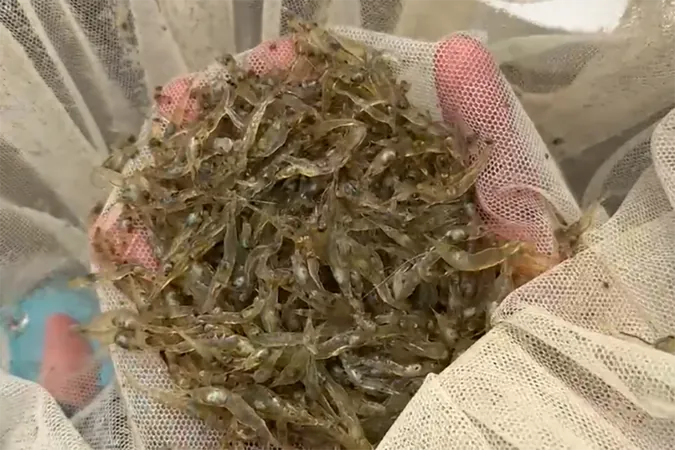
Unlocking the Secrets: How Dietary Tannins Boost Ammonia Stress Resistance in Pacific White Shrimp!
2024-10-07
Author: Nur
Recent studies have revealed that tannin supplementation in the diet of Pacific white shrimp (Litopenaeus vannamei) can significantly bolster their defenses against the detrimental effects of ammonia stress. This groundbreaking research sheds light on the complex relationship between shrimp health and nutrition, providing critical insights that could revolutionize aquaculture practices.
The intensification of shrimp farming often leads to elevated ammonia levels, creating a challenging environment that adversely affects shrimp health, survival rates, and overall productivity. Ammonia exposure not only disrupts shrimp immunity but can also result in severe tissue damage or death, making it essential to identify effective dietary strategies for mitigating these risks.
Tannins, natural phenolic compounds found abundantly in various plants, have emerged as potential game-changers in aquatic nutrition. Known for their strong antioxidant properties, tannins inhibit the absorption of harmful microorganisms, thereby promoting better gut health and enhancing the overall immune system. As antibiotic alternatives become increasingly sought after, tannins have gained popularity in animal feeds, including aquaculture.
The study was meticulously conducted at the State Key Laboratory of Mariculture Biobreeding and Sustainable Goods in Qingdao, China, where healthy shrimp were subjected to a controlled feeding trial. Two groups were created: one receiving a standard diet, while the other received a diet enriched with 800 mg of tannins per kg. After a 56-day feeding period, researchers assessed the impacts of dietary tannins during an acute ammonia stress test.
The results were nothing short of remarkable. While untreated shrimp exhibited significant gene expression changes—over 4,185 differentially expressed genes (DEGs) and alterations across 59 signaling pathways—tannin-fed shrimp only displayed 964 DEGs and modifications in just six pathways. This suggests that dietary tannins play a crucial role in maintaining the balance of gene expression amidst stressful conditions.
Among the key findings, researchers identified enzymes and pathways associated with the immune response. The phenolic oxidase enzyme, vital for shrimp immunity, showed decreased activity under ammonia stress in untreated shrimp, but its function remained stable in the tannin-supplemented group. This indicates that tannins help sustain immune function, potentially activating critical defense mechanisms.
Furthermore, lysozyme levels—essential for countering bacterial infections—were notably reduced after ammonia exposure in shrimp without tannin. However, those receiving the tannin diet displayed increased lysozyme levels during stress, signifying that tannin supplementation actively promotes immune resilience.
Additionally, metabolic analyses revealed that tannins also influence amino acid metabolism, essential for normal growth and stress resistance. Amino acids such as L-histidine and arginine increased in tannin-fed shrimp, underscoring their potential role in enhancing stress responses and overall shrimp health.
These findings underscore the importance of integrating natural supplements like tannins into aquaculture diets to not only improve shrimp health but also increase productivity and sustainability in farming practices. The insights provided by this research pave the way for further studies into nutritional strategies that safeguard aquatic life from environmental stressors.
In summary, incorporating dietary tannins into shrimp diets emerges as a scientifically backed strategy for enhancing ammonia stress resistance and supporting the immune system. As we look to the future of aquaculture, understanding and applying these nutritional advancements could lead to healthier shrimp populations, ensuring a balanced ecosystem and a stable supply of this vital resource. Stay tuned as we continue to uncover more innovations in aquaculture practices!


 Brasil (PT)
Brasil (PT)
 Canada (EN)
Canada (EN)
 Chile (ES)
Chile (ES)
 España (ES)
España (ES)
 France (FR)
France (FR)
 Hong Kong (EN)
Hong Kong (EN)
 Italia (IT)
Italia (IT)
 日本 (JA)
日本 (JA)
 Magyarország (HU)
Magyarország (HU)
 Norge (NO)
Norge (NO)
 Polska (PL)
Polska (PL)
 Schweiz (DE)
Schweiz (DE)
 Singapore (EN)
Singapore (EN)
 Sverige (SV)
Sverige (SV)
 Suomi (FI)
Suomi (FI)
 Türkiye (TR)
Türkiye (TR)